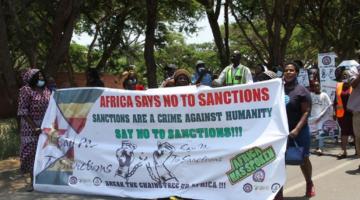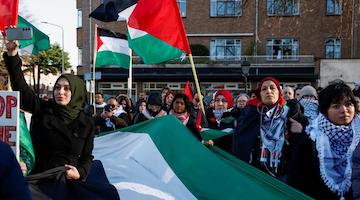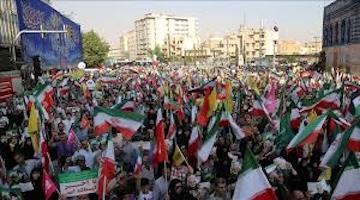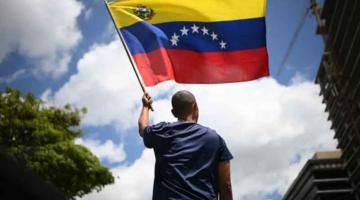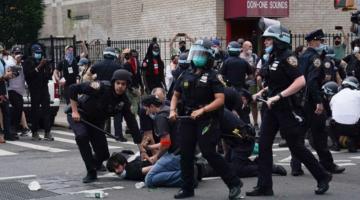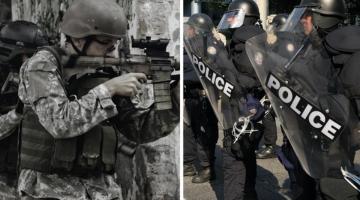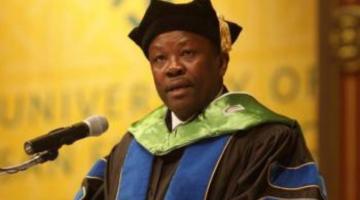The death of Alberto Fujimori should signal the end of a devastating and tragic era for the Peruvian masses. However, the violence and corruption that were staples of his regime remain prominent features of the current government.
Former dictator and genocidaire Alberto Fujimori died on September 11, nine months after Peru’s Supreme Court illegally reinstated his pardon for crimes against humanity. His daughter and three-time presidential election loser, Keiko Fujimori, announced his death on the X platform a day after rumors started swirling. Sadly, Fujimori died peacefully in his home surrounded by family despite being responsible for massacres, torture, forced sterilizations, crimes against humanity, economic shock therapy and the selling off of the country to US economic and military interests. The families of his victims received neither reparations nor a formal apology. Though the former far-right ruler has died, his reactionary anti-communist political legacy carries on in the current coup regime and Congress and the parties of the racist petit bourgeois class in Lima (where law students mocked George Floyd’s lynching).
Before moving to the United States as a child, I grew up in Barrios Altos, one of the poorest neighborhoods in Peru. My mother grew up there with her 6 siblings and her single mother who would wash the neighbors’ clothes to feed her kids. When I was a child, three generations lived in the same home. Every Sunday I went to Plaza Italia to climb the statues and stop by our favorite choripan spot (RIP Yo Mismo Soy) with my brother and paternal grandfather, who we affectionately called Pacapaca. Though it was considered a “rough” neighborhood, it was home. And then came the early November 1991 massacre that killed 15 people, including an 8-year-old boy, at a birthday party.
By the end of the following year we left the only home I had ever known. This was one of only two massacres under Fujimori’s rule that he would eventually be judged for by the Inter-American Commission on Human Rights as well as internal legal institutions. The other was the case of La Cantuta, during which a professor and nine students were kidnapped and disappeared by the army death squad Grupo Colina, which was armed and funded by the dictatorship. He was sentenced to 25 years in prison in 2009, 18 years after the massacre in my barrio.
Fujimori fled to Japan in 2000 amid mounting evidence against him and faxed in his resignation. He was later arrested in 2005 in Chile and extradited to Peru two years later to face trial for corruption, crimes against humanity and human rights abuses. In 2009, it was found that none of those massacred had any ties to the Shining Path, which was the supposed basis for the massacres.
Fujimori was held in Penal Barbadillo (where the legal president of Perú, Pedro Castillo, is still held under pre-trial detention) for 12 years of his 25-year sentence. Though Fujimori’s conviction marked the first time a head of state was extradited and tried on the charge of crimes against humanity, his illegal pardon by the Supreme Court shattered any pretense of justice having been served. It did, however, prove that Fujimori was still in charge institutionally and his daughter Keiko was his dutiful mouthpiece. On September 12, 2024, a day after his death, current president Dina Boluarte, knowing where her power comes from, decreed an official three days of mourning to honor the genocidaire. Without a Congress ruled by Fujimori’s Fuerza Popular and its satellite parties, Boluarte would not be in power. After his release from prison he publicly endorsed Boluarte’s government and stated she should remain in power until 2026.
This was not Fujimori’s first time being released on an illegal pardon for the two massacres for which he was found guilty. On Christmas Eve 2017, amid accusations of corruption, money laundering and the formation of a criminal organization, then president Pedro Pablo Kuczynski (PPK) pardoned Fujimori as a reward for Kenji Fujimori (his son and a Congressman) voting against PPK’s impeachment. Almost a year later, the Supreme Court overturned the pardon and Fujimori was forced back to prison.
The political corruption, neoliberal policies, austerity measures, selling off of natural resources, and handing over Peruvian sovereignty to the Yankees have continued. Perhaps the biggest example of Fujimori’s continued ideological and systematic control is the 1993 constitution, which he rammed through during his dictatorship and remains in effect. That constitution effectively privatized Peru’s resources under 30-year contract laws, which were due to expire in 2023. These contract laws are currently being reworked by the Fujimori controlled Congress to continue for a longer period of time. This is the constitution that Castillo was voted in to scrap and replace by a constituent assembly that would write a more just constitution that would return Peru’s resources to its peoples.
Boluarte’s call for three days of national mourning last month signaled that the US-backed regime was the ideological continuation of Fujimori’s dictatorship. It also indicates that despite being convicted for crimes against humanity and human rights abuses among other crimes, the system Fujimori forced upon us at the barrel of US guns remains alive and well. I write this report from a bar not far from Barrios Altos, pouring one out for my neighbors and compatriots who never saw justice. La lucha continúa.
--------------------------------------------------------------------------------------------------------------------------------------
En Español
Fujimori Esta Muerto, El Fujimorismo No
El exdictador y genocida Alberto Fujimori murió el 11 de septiembre, nueve meses después de que la Corte Suprema de Perú restableciera ilegalmente su indulto por crímenes de lesa humanidad. Su hija y tres veces perdedora en elecciones presidenciales, Keiko Fujimori, anunció su muerte en X un día después de que comenzaran a circular rumores. Lamentablemente, Fujimori falleció pacíficamente en su hogar rodeado de su familia, a pesar de ser responsable de masacres, torturas, esterilizaciones forzadas, crímenes de lesa humanidad, terapias de choque económico y la venta del país a los intereses económicos y militares de los Estados Unidos. Los familiares de sus víctimas no recibieron reparaciones ni una disculpa formal. Aunque el exgobernante de extrema derecha ha muerto, su legado político reaccionario y anticomunista continúa en el régimen de facto actual y en el Congreso, así como en las fiestas de la clase pituca y racista en Lima (donde estudiantes de derecho se burlaron del linchamiento de George Floyd).
Antes de mudarme a los Estados Unidos cuando era niña, crecí en Barrios Altos, uno de los barrios más pobres de Perú. Mi madre creció allí junto con sus 6 hermanos y su madre soltera, quien lavaba la ropa de los vecinos para alimentar a sus hijos. Cuando era niña, tres generaciones vivían en la misma casa. Cada domingo iba a la Plaza Italia para trepar las estatuas y pasar por nuestro puesto favorito de choripanes (QEPD Yo Mismo Soy) con mi hermano y mi abuelo paterno, a quien cariñosamente llamábamos Pacapaca. Aunque era considerado un barrio “peligroso”, era mi hogar. Y luego llegó la masacre de principios de noviembre de 1991 que mató a 15 personas, incluido un niño de 8 años, durante una pollada.
A finales del año siguiente, dejamos el único hogar que había conocido. Esta fue una de las dos masacres bajo el gobierno de Fujimori por las que eventualmente sería juzgado por la Comisión Interamericana de Derechos Humanos, así como por instituciones legales internas. La otra fue el caso de La Cantuta, durante el cual un profesor y nueve estudiantes fueron secuestrados y desaparecidos por el escuadrón de la muerte del ejército, el Grupo Colina, que fue armado y financiado por la dictadura. Fue condenado a 25 años de prisión en 2009, 18 años después de la masacre en mi barrio.
Fujimori huyó a Japón en 2000 en medio de crecientes pruebas en su contra y envió su renuncia por fax. Posteriormente, fue detenido en 2005 en Chile y extraditado a Perú dos años después para enfrentar un juicio por corrupción, crímenes de lesa humanidad y violaciones de derechos humanos. En 2009, se determinó que ninguno de los masacrados tenía vínculos con Sendero Luminoso, que fue la supuesta justificación para las masacres.
Fujimori estuvo en Penal Barbadillo (donde el presidente legítimo de Perú, Pedro Castillo, aún se encuentra bajo detención preventiva) durante 12 de los 25 años de su condena. Aunque la condena de Fujimori marcó la primera vez que un jefe de Estado fue extraditado y juzgado por crímenes de lesa humanidad, su indulto ilegal por parte de la Corte Suprema destrozó cualquier pretensión de que se hubiera hecho justicia. Sin embargo, demostró que Fujimori seguía estando a cargo institucionalmente y que su hija Keiko era su portavoz leal. El 12 de septiembre de 2024, un día después de su muerte, la actual presidenta Dina Boluarte, sabiendo de dónde proviene su poder, decretó tres días oficiales de duelo nacional para honrar al genocida. Sin un Congreso dominado por Fuerza Popular de Fujimori y sus partidos satélites, Boluarte no estaría en el poder. Tras su liberación, Fujimori respaldó públicamente el gobierno de Boluarte y declaró que ella debía permanecer en el poder hasta 2026.
Esta no fue la primera vez que Fujimori fue liberado con un indulto ilegal por las dos masacres por las que fue declarado culpable. En Nochebuena de 2017, en medio de acusaciones de corrupción, lavado de dinero y la formación de una organización criminal, el entonces presidente Pedro Pablo Kuczynski (PPK) indultó a Fujimori como recompensa por el voto de Kenji Fujimori (su hijo y congresista) en contra de la destitución de PPK. Casi un año después, la Corte Suprema revocó el indulto y Fujimori fue obligado a regresar a prisión.
La corrupción política, las políticas neoliberales, las medidas de austeridad, la venta de los recursos naturales y la entrega de la soberanía peruana a los yanquis han continuado. Quizás el mayor ejemplo del control ideológico y sistemático que aún ejerce Fujimori es la constitución de 1993, que impuso durante su dictadura y que sigue vigente. Esa constitución privatizó efectivamente los recursos de Perú bajo leyes de contratos de 30 años, que deberían vencer en 2023. Estas leyes de contratos están siendo actualmente renegociadas por el Congreso controlado por los fujimoristas para prolongarlas aún más. Esta es la constitución que Castillo fue elegido para desmantelar y reemplazar por una asamblea constituyente que redactaría una constitución más justa, devolviendo los recursos de Perú a su pueblo.
El llamado de Boluarte a tres días de duelo nacional el mes pasado señaló que el régimen respaldado por los Estados Unidos es la continuación ideológica de la dictadura de Fujimori. También indica que, a pesar de haber sido condenado por crímenes de lesa humanidad y violaciones de derechos humanos, entre otros delitos, el sistema que Fujimori nos impuso a punta de armas estadounidenses sigue vivo y vigente. Escribo este reportaje desde un bar no muy lejos de Barrios Altos, brindando por mis vecinos y compatriotas que nunca vieron justicia. La lucha continúa.
Clau O'Brien Moscoso is an organizer with the Black Alliance for Peace in the Haiti/Americas Team. Originally from Barrios Altos, Lima, she grew up in New Jersey and now lives between both countries.

